Rich, poor, feminist and gay, celebrities and street kids, everyone chants the same slogan: "end SARS now", in reference to the Special Anti-Robbery Squad, a police unit widely accused of human rights violations.
CARNIVAL
DANCING IN THE STREETS AS PROTEST
A FESTIVAL OF CONTESTATION
in what has become an ongoing festival of contestation.
By Pierre FAVENNEC (AFP)
Dancing, chanting and determined: thousands of young Nigerians are jamming the streets of megacity Lagos to protest against police violence and vent at a society they feel sidelines them.
West Africa's economic hub and beating heart, normally bustling with traffic, is at a standstill as demonstrators have occupied major roads day after day since last week.
The gigantic Lekki Toll Gate, a key junction in and out of the city of 20 million people, is the main stage for the ongoing festival of contestation.
DJs take turns on a makeshift stage in front of a jubilant crowd, while others set up pool tables and hustlers sell soft drinks nearby.
Convertible Mercedes and beaten-up cars park side by side in the middle of the crowd, windows down and pumping music, as onlookers drink beers and raise clenched-fisted salutes.
Better-off protesters distribute water bottles and soft drinks. Popular food chains hand out provisions. Nigeria's green and white flag goes from hand to hand for selfies.

Dancing, chanting and determined: thousands of young Nigerians are jamming the streets of megacity Lagos to protest against police violence and vent at a society they feel sidelines them.
West Africa's economic hub and beating heart, normally bustling with traffic, is at a standstill as demonstrators have occupied major roads day after day since last week.
The gigantic Lekki Toll Gate, a key junction in and out of the city of 20 million people, is the main stage for the ongoing festival of contestation.
DJs take turns on a makeshift stage in front of a jubilant crowd, while others set up pool tables and hustlers sell soft drinks nearby.
Convertible Mercedes and beaten-up cars park side by side in the middle of the crowd, windows down and pumping music, as onlookers drink beers and raise clenched-fisted salutes.
Better-off protesters distribute water bottles and soft drinks. Popular food chains hand out provisions. Nigeria's green and white flag goes from hand to hand for selfies.

Protesters have gathered at the Lekki Toll Gate, a key junction in and out of the city of 20 million people. By Pierre FAVENNEC (AFP)
Rich, poor, feminist and gay, celebrities and street kids, everyone chants the same slogan: "end SARS now", in reference to the Special Anti-Robbery Squad, a police unit widely accused of human rights violations.
The slogan, initially launched to denounce the unit after a video of a man being allegedly killed by police went viral last month, has become a rallying cry against injustice and for more freedom.
'Not going anywhere'
"If we have money on our bank account, they say we are Yahoo boys (cybercriminals). If we wear earrings, they say we are gay (illegal in Nigeria). If we have dreadlocks, they say we smoke weed," Femi Daniel, a 33-year-old demonstrator tells AFP.
"We are tired, we are not free in this country."
Bowing under pressure and faced with a massive online campaign supported by celebrities like Cardi B, Kanye West or Twitter's CEO Jack Dorsey, the government dissolved SARS and announced a raft of police reforms.
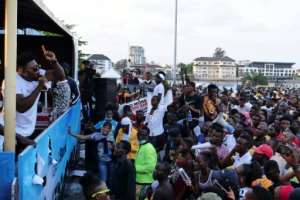
Rich, poor, feminist and gay, celebrities and street kids, everyone chants the same slogan: "end SARS now", in reference to the Special Anti-Robbery Squad, a police unit widely accused of human rights violations.
The slogan, initially launched to denounce the unit after a video of a man being allegedly killed by police went viral last month, has become a rallying cry against injustice and for more freedom.
'Not going anywhere'
"If we have money on our bank account, they say we are Yahoo boys (cybercriminals). If we wear earrings, they say we are gay (illegal in Nigeria). If we have dreadlocks, they say we smoke weed," Femi Daniel, a 33-year-old demonstrator tells AFP.
"We are tired, we are not free in this country."
Bowing under pressure and faced with a massive online campaign supported by celebrities like Cardi B, Kanye West or Twitter's CEO Jack Dorsey, the government dissolved SARS and announced a raft of police reforms.

It is Nigeria's entertainers and pop stars, icons whose influence stretches across social classes, rather than politicians who are supporting the movement. By Pierre FAVENNEC (AFP)
But it has not been enough to appease the anger and determination of the street.
The creation of a new SWAT team to replace SARS is among the newly announced measures that protesters oppose.
Quickly, the hashtag #EndSWAT was added to #EndSARS and hundreds more people continued to join the movement in a string of cities including in the capital Abuja.
"#EndSARS united us. Now our eyes are open and we are fighting. Our independence is starting now," Daniel says.
Cynthia Shalom, a famous actress in Nigeria's Nollywood film industry, is determined to keep the movement going.
She insists the government address five main demands: the release of all arrested protesters, compensation for families of victims of police abuse, the setting up of an independent investigative body, psychological evaluation of all disbanded SARS officers and an increase of police salaries.
"They think we are joking. They look at us, sitting in their offices, and they think we are kids partying and that we will go home. I can tell you, we are not going anywhere, I am so proud of our generation," she says.
'Protests have snowballed'
"The protests have snowballed into an outlet for latent anger and frustration," Leena Koni Hoffmann, associate fellow at Chatham House wrote.
"Nigeria has the largest number of young people in poverty in the world, as well as the most food insecure households in West Africa."
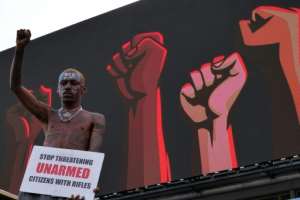
But it has not been enough to appease the anger and determination of the street.
The creation of a new SWAT team to replace SARS is among the newly announced measures that protesters oppose.
Quickly, the hashtag #EndSWAT was added to #EndSARS and hundreds more people continued to join the movement in a string of cities including in the capital Abuja.
"#EndSARS united us. Now our eyes are open and we are fighting. Our independence is starting now," Daniel says.
Cynthia Shalom, a famous actress in Nigeria's Nollywood film industry, is determined to keep the movement going.
She insists the government address five main demands: the release of all arrested protesters, compensation for families of victims of police abuse, the setting up of an independent investigative body, psychological evaluation of all disbanded SARS officers and an increase of police salaries.
"They think we are joking. They look at us, sitting in their offices, and they think we are kids partying and that we will go home. I can tell you, we are not going anywhere, I am so proud of our generation," she says.
'Protests have snowballed'
"The protests have snowballed into an outlet for latent anger and frustration," Leena Koni Hoffmann, associate fellow at Chatham House wrote.
"Nigeria has the largest number of young people in poverty in the world, as well as the most food insecure households in West Africa."

The creation of a new SWAT team to replace the Special Anti-Robbery Squad is among the newly announced measures that protesters oppose. By Pierre FAVENNEC (AFP)
This social uprising is first and foremost the result of a generational divide, where the youth does not identify with its ageing rulers.
President Muhammadu Buhari, 77 and a conservative Muslim, is at the helm of a country where half of its 200 million people are under the age of 30 and where the median age is 18.
It is Nigeria's pop stars, icons whose influence stretches across social classes, rather than politicians who are supporting the movement.
"We don't have a leader. But the youth, the masses wanted us, the celebrities, to speak out. Now I am out, and I'm staying here," Peter Okoye, a singer known as Mr P with 9 million Instagram followers, says.
Standing on his luxury 4x4, the performer's voice crackles as he shouts to the crowd.
"I shouldn't be here you know. I am 40, I have a good life, I made it. But one day, my son, my daughter, they will ask me what I was doing in October 2020, and I will tell them 'I was fighting for you'."
What to know about Nigeria's #EndSARS protests
This social uprising is first and foremost the result of a generational divide, where the youth does not identify with its ageing rulers.
President Muhammadu Buhari, 77 and a conservative Muslim, is at the helm of a country where half of its 200 million people are under the age of 30 and where the median age is 18.
It is Nigeria's pop stars, icons whose influence stretches across social classes, rather than politicians who are supporting the movement.
"We don't have a leader. But the youth, the masses wanted us, the celebrities, to speak out. Now I am out, and I'm staying here," Peter Okoye, a singer known as Mr P with 9 million Instagram followers, says.
Standing on his luxury 4x4, the performer's voice crackles as he shouts to the crowd.
"I shouldn't be here you know. I am 40, I have a good life, I made it. But one day, my son, my daughter, they will ask me what I was doing in October 2020, and I will tell them 'I was fighting for you'."
What to know about Nigeria's #EndSARS protests
"end SARS now", in reference to the Special Anti-Robbery Squad, a police unit widely accused of human rights violations.
By AFP 16.10.2020 NIGERIA
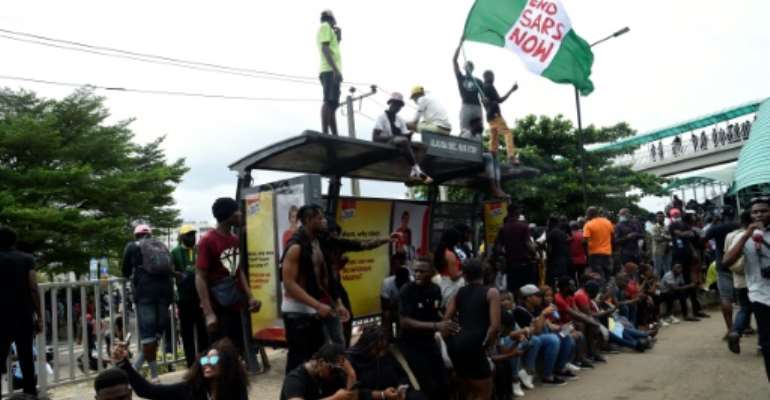
Demonstrators have made five demands that include structural police reforms and better pay for officers. By PIUS UTOMI EKPEI (AFP)
Protests against police violence in Nigeria show no sign of stopping as thousands continue to take to the streets despite announcements of reforms by the government.
The demonstrations erupted this month and were initially focused on abolishing the federal Special Anti-Robbery Squad (SARS), accused of unlawful detention, extortion and extra-judicial killings.
But after the government announced the unit would be dissolved, thousands of mainly young protesters have remained out on the streets pushing for genuine change in the country.
Why did the protests start?
In early October a video spread on social media showing what looked like a SARS officer attacking a man in Delta state.
The video was shared massively in the country of 200 million people and thousands started sharing their own stories of police abuse online.
"Nigerian youth have campaigned against SARS for years," Bulama Bukarti wrote for the Center for Strategic and International Studies.
But the recent video "resonated with thousands across the country and led to youth pouring out en masse onto the streets."
Why did the protests spread?
In the course of days, the hashtag #EndSARS topped the global trends on Twitter, supported by world famous Afrobeat popstars like Davido and Wizkid. Their engagement gave visibility to the movement.


Demonstrators have made five demands that include structural police reforms and better pay for officers. By PIUS UTOMI EKPEI (AFP)
Protests against police violence in Nigeria show no sign of stopping as thousands continue to take to the streets despite announcements of reforms by the government.
The demonstrations erupted this month and were initially focused on abolishing the federal Special Anti-Robbery Squad (SARS), accused of unlawful detention, extortion and extra-judicial killings.
But after the government announced the unit would be dissolved, thousands of mainly young protesters have remained out on the streets pushing for genuine change in the country.
Why did the protests start?
In early October a video spread on social media showing what looked like a SARS officer attacking a man in Delta state.
The video was shared massively in the country of 200 million people and thousands started sharing their own stories of police abuse online.
"Nigerian youth have campaigned against SARS for years," Bulama Bukarti wrote for the Center for Strategic and International Studies.
But the recent video "resonated with thousands across the country and led to youth pouring out en masse onto the streets."
Why did the protests spread?
In the course of days, the hashtag #EndSARS topped the global trends on Twitter, supported by world famous Afrobeat popstars like Davido and Wizkid. Their engagement gave visibility to the movement.

In the streets and online, the youth has been asking for more and better jobs, an end to power cuts, more freedom of expression and better representation in politics.
By PIUS UTOMI EKPEI (AFP)
There was a violent crackdown by police on some of the first protests. At least 10 people were killed and hundreds were injured according to Amnesty International.
The brutal response drew more people onto the streets and emboldened protesters began to push further.
Who supports the movement ?
As numbers have swelled at home, eye-catching demonstrations have also been held abroad, most notably involving the large Nigerian community in London.
"The diaspora's participation was immensely impactful because Nigerian politicians are easily unsettled by negative news outside the country, especially in the West," said Bukarti.
Following in the steps of Nigerian celebrities, international stars like Cardi B, Kanye West and Twitter's CEO Jack Dorsey joined in and expressed support for #EndSARS.
How is the government responding?
Bowing to the pressure, president Muhammadu Buhari announced on October 11 that SARS would be dissolved, with immediate effect.
He said the move was "only the first step" in more extensive reforms to Nigeria's police.
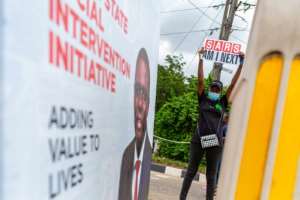
There was a violent crackdown by police on some of the first protests. At least 10 people were killed and hundreds were injured according to Amnesty International.
The brutal response drew more people onto the streets and emboldened protesters began to push further.
Who supports the movement ?
As numbers have swelled at home, eye-catching demonstrations have also been held abroad, most notably involving the large Nigerian community in London.
"The diaspora's participation was immensely impactful because Nigerian politicians are easily unsettled by negative news outside the country, especially in the West," said Bukarti.
Following in the steps of Nigerian celebrities, international stars like Cardi B, Kanye West and Twitter's CEO Jack Dorsey joined in and expressed support for #EndSARS.
How is the government responding?
Bowing to the pressure, president Muhammadu Buhari announced on October 11 that SARS would be dissolved, with immediate effect.
He said the move was "only the first step" in more extensive reforms to Nigeria's police.

A youth holds up a sign reading "Am I Next?". By Benson Ibeabuchi (AFP)
A new SWAT unit was announced to replace SARS, with promises that it will be "ethical".
SARS officers will not be eligible for the new unit and will have to undergo psychological evaluation before being redeployed, police said.
The government said police abuses will be investigated and prosecuted.
But these announcements have not appeased the street and demonstrations have continued.
How long will protests last?
"Nigerians are sceptical of the authorities' pledge to end police atrocities because the past claims of reforming SARS have turned out to be empty words," said Osai Ojigho, director of Amnesty International Nigeria.
Demonstrators have made five demands that include structural police reforms and better pay for officers.
"Senior ranking officers are known to maintain a perverse bribery pyramid which requires that poorly paid rank-and-file officers transfer bribes extorted from citizens up the chain of command," wrote Leena Koni Hoffmann, associate fellow at Chatham House.
Many of the demonstrators have begun calling for more wide-sweeping change as they look to seize the moment to bring real change to their country.
While Nigeria is Africa's largest economy, more than half of the populaton lives in poverty and youth unemployment rates are significant.
In the streets and online, the youth has been asking for more and better jobs, an end to power cuts, more freedom of expression and better representation in politics.
For some, like Bukarti, "this may just be the beginning, rather than the end, of massive protests in Nigeria."
A new SWAT unit was announced to replace SARS, with promises that it will be "ethical".
SARS officers will not be eligible for the new unit and will have to undergo psychological evaluation before being redeployed, police said.
The government said police abuses will be investigated and prosecuted.
But these announcements have not appeased the street and demonstrations have continued.
How long will protests last?
"Nigerians are sceptical of the authorities' pledge to end police atrocities because the past claims of reforming SARS have turned out to be empty words," said Osai Ojigho, director of Amnesty International Nigeria.
Demonstrators have made five demands that include structural police reforms and better pay for officers.
"Senior ranking officers are known to maintain a perverse bribery pyramid which requires that poorly paid rank-and-file officers transfer bribes extorted from citizens up the chain of command," wrote Leena Koni Hoffmann, associate fellow at Chatham House.
Many of the demonstrators have begun calling for more wide-sweeping change as they look to seize the moment to bring real change to their country.
While Nigeria is Africa's largest economy, more than half of the populaton lives in poverty and youth unemployment rates are significant.
In the streets and online, the youth has been asking for more and better jobs, an end to power cuts, more freedom of expression and better representation in politics.
For some, like Bukarti, "this may just be the beginning, rather than the end, of massive protests in Nigeria."
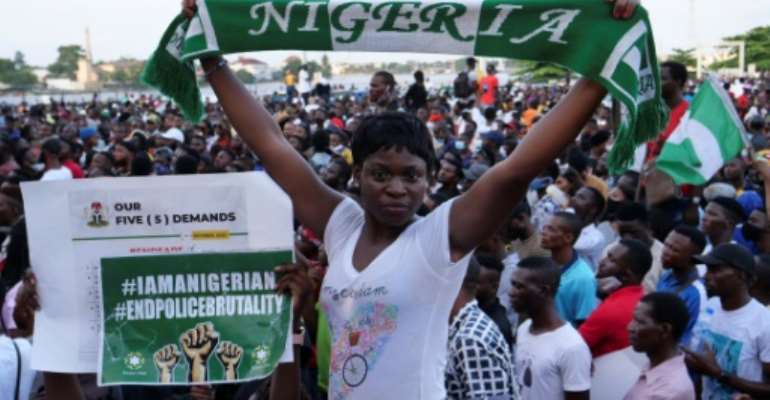
No comments:
Post a Comment